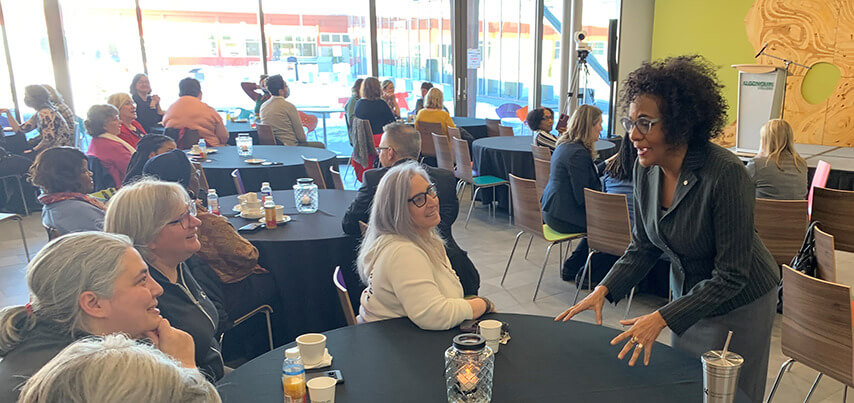Former governor general speaks on gender inequality in digital technology
Posted on Wednesday, March 8th, 2023
 In an event hosted by the Leadership Development for Women Working Group at Algonquin College, the Right Honourable Michaëlle Jean held a captive audience as the keynote speaker for International Women’s Day on March 8, 2023. Highlighting the United Nations (UN) theme for International Women’s Day 2023, DigitALL: Innovation and technology for gender equality, Jean addressed gender inequality in the technology sector and women’s experiences with online violence, as well as the experiences of visible minority women in Canada.
In an event hosted by the Leadership Development for Women Working Group at Algonquin College, the Right Honourable Michaëlle Jean held a captive audience as the keynote speaker for International Women’s Day on March 8, 2023. Highlighting the United Nations (UN) theme for International Women’s Day 2023, DigitALL: Innovation and technology for gender equality, Jean addressed gender inequality in the technology sector and women’s experiences with online violence, as well as the experiences of visible minority women in Canada.
“Women have made untold contributions to the digital world in which we increasingly live,” said Jean. “Today, persistent gender gap in digital access keeps women from unlocking their potential.”
According to the UN, only 22 per cent of positions in artificial intelligence are held by women, with two in 10 women holding jobs in science, technology, engineering and mathematics (STEM) globally. These numbers are concerning, as 75 per cent of all jobs are projected to be related to STEM fields by 2050. Those who do make it into technology often face a hostile work environment with a significant pay gap and half the rates of promotion as men.
Online threats and harassment continue to be pervasive for women worldwide. The UN 2022 Gender Snapshot Report shows 38 per cent of women in 51 countries had personally experienced online violence. Online gender-based violence, coupled with a lack of legal resources, forces women out of the digital spaces they occupy.
In Canada, online violence towards women was the subject of a petition submitted to the Quebec legislature in January 2023. The petition, which garnered 30,000 signatures, called on the government to take action against cyber violence by legislating social media platforms to address misogynist hate speech and online harassment or face significant financial penalties.
“Too many of us can testify to the virulent hatred women receive online. Online harassment, insults, … sextortion, rape threats, death threats, all go unpunished in the vast majority of cases,” said Jean. “All that should not discourage us. Let us call on everyone – governments, education institutions, activists, the private sector – to make the digital world safer, more inclusive and equitable.”
Despite the gender inequity challenges in the digital environment, Jean acknowledges how digital technology is opening doors for women in all groups. Facing a global future together is important for women and girls, she said.
Jean further reflected on the history of women’s struggles for equality and justice in Canada. While women first gained the right to vote in 1918, it wasn’t until 1960 that the same right was extended to First Nations Peoples.
“I can hear the voices of women who came before us.… We wouldn’t be here were if not for the constant struggles of our foremothers. It was as a time not long ago where our presence in intuitions of higher learning, the House of Commons, the Senate and in boardrooms would have been unthinkable,” said Jean. “Always remember all we have to conquer simply to be recognized as human beings with freedoms to choose. Ours in a history of resistance for the right to work, study and exist.”
Canada still has a long way to go to address inequality for Black women. According to Statistics Canada, Black Canadians are less likely to own their own home than any other racialized population. Working-aged Black women are less likely to be employed and hold a lower income than the rest of the population.
Jean reflected on the lifelong impacts these experiences will have on Black Canadians, as well as the toll of exclusion.
“Exclusion creates an enormous deficit of ideas, of constructive energies, synergies and possibilities to innovate. A deficit of participation, a deficit of growth and a deficit of development. This is what exclusions does to us all and to our nation and to our society,” she said. “We need to build the longest, strongest, human chain ever seen in history, hand-to-hand solidarity extended across life experiences, skin colour, gender identities and cultural backgrounds. It is essential that all of us unite – Black, First Nations, Inuit and Métis Peoples, White, Asian, humans of all stripes – around our future and the sacredness of life.”
A recording of the event is available here.